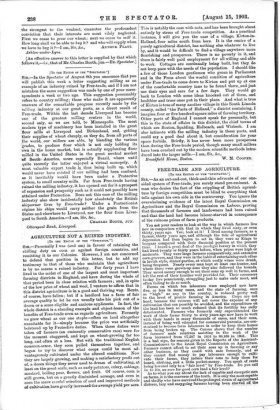[To THE EDITOR OP THE "SPECTATOR. "] SIR, --In the Spectator of
August 8th you announce that you will publish this week a letter suggesting milling as an
example of an industry ruined by Free-trade, and if I am not mistaken the same suggestion was made by one of your corre- spondents a week or two ago. This suggestion presumably refers to country milling; those who make it are apparently unaware of the remarkable progress recently made by the milling industry at our great ports, as a direct result of Free-trade. Within the last decade Liverpool has become one of the greatest milling centres in the world, second only, so we are told, to Minneapolis. The most modern type of machinery has been installed in the great
`flour mills at Liverpool and Birkenhead, and, getting their supplies of wheat cheaply, as they do, from all parts of 'the world, our millers are able, by blending the various grades, to produce flour which is not only holding its 'own. in the home market, but is actually supplanting flour milled in the United States in the great neutral market 'et South=• America, more especially Brazil, where until.
quite recently the latter enjoyed -a virtual monopoly. A' most valuable expert. trade_ is thus:being built up, which would never have existed if our milling had been confined, as it inevitably would have been under a Protective system, to small country mills. Far from Free-trade having ruined the milling industry, it has opened out for it a prospect, of expansion and prosperity such as it could not possibly have attained under Protection. Does not this case of the milling industry also show incidentally how absolutely the British shipowner lives by Free-trade ? Under a Protectionist regime his ships would carry neither the grain from the States and elsewhere to Liverpool, nor the flour from Liver- pool to South America.—I am, Sir, &c., Otterspool Bank, Liverpool.
CHARLES BOOTH, JUN.






































 Previous page
Previous page